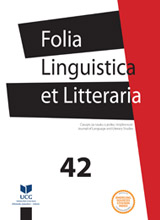Nastava jezika struke na daljinu – izazovi i perspektive
ONLINE LSP TEACHING – CHALLENGES AND PERSPECTIVES
Author(s): Katarina Radojković IlićSubject(s): Social Sciences, Language studies, Language and Literature Studies, Education, Foreign languages learning, Distance learning / e-learning
Published by: Filološki fakultet, Nikšić
Keywords: distance learning; online language learning; LSP teaching; legal French
Summary/Abstract: The subject of this paper is the benefits and drawbacks of the online delivery of classes and the comparison of online and traditional forms of teaching and learning. As a result of the pandemic in the academic year of 2019/2020, educational institutions were forced to switch from traditional teaching to an online environment almost overnight. The purpose of this research is to identify advantages and problems as perceived by the students, with the aim of gaining a deeper insight into different aspects of online language teaching and learning and of improving the quality of online lessons. Besides providing the theoretical background and a historical review of distance learning, the paper also presents the results of research conducted with the students of the Faculty of Law at the University of Belgrade and offers insights into students’ experience of the online learning environment and their attitudes toward traditional and online classes. The research includes the analysis of questionnaires taken by a group of undergraduate students who had chosen to study French legal language. The questionnaire was composed of 24 questions. One set of questions was open-ended and the respondents were asked to write their own answers about the benefits and drawbacks of the online delivery of classes and to make their own suggestions as to how to improve the quality of online classes. The other set consisted of closed questions and questions based on the Likert scale. Some of the problems that students pointed out included a lack of technical equipment, IT infrastructure and a lack of computer literacy on the part of some te achers. The results also demonstrate the importance of different psychological and social factors in teaching and learning. They demonstrate that 50% of students still prefer traditional classes to online lectures. The social aspect of learning is shown as an important factor because students replied that the main disadvantage of online teaching was the lack of interaction either between the teacher and the students or between the students themselves. According to the respondents, the major benefits include saving time and money, and the opportunity to record lectures and review them for revision and consolidation. The analysis of the answers shows that the online delivery of classes did not influence the acquisition of linguistic components such as vocabulary, grammar or speaking skills. They also show a positive influence on students’ learning autonomy, self-confidence and motivation. Although the number of respondents includes only a small group of students, the analysis of the answers shows, in any case, certain important aspects related to the students’ attitudes towards the nature of online lectures. They point out the importance of the social aspect of education that has to be taken into consideration.
Journal: Folia Linguistica et Litteraria
- Issue Year: 2022
- Issue No: 42
- Page Range: 151-164
- Page Count: 14
- Language: Serbian

